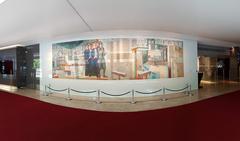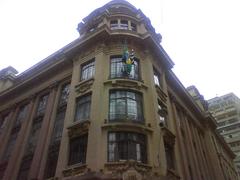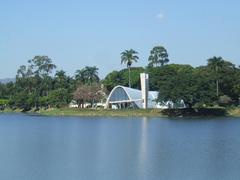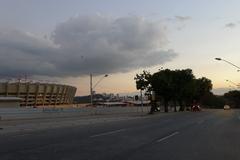Deusa Das Águas Belo Horizonte: Visiting Hours, Tickets, and Historical Sites Guide
Date: 14/06/2025
Introduction
Deusa Das Águas (“Goddess of the Waters”) stands as a powerful cultural and artistic symbol in Belo Horizonte, Brazil. This iconic public sculpture, rooted in indigenous and Afro-Brazilian traditions, reflects the city’s intimate relationship with water, urban planning, and spiritual life. Integrated within the Pampulha Modern Ensemble—a UNESCO World Heritage Site—the monument invites visitors to explore Belo Horizonte’s layered heritage, environmental stewardship, and vibrant community spirit. This guide offers detailed information on Deusa Das Águas visiting hours, ticketing, accessibility, and nearby historical sites, ensuring a rewarding and respectful experience for travelers.
The Cultural and Mythological Significance of Deusa Das Águas
Origins and Symbolism
The concept of Deusa Das Águas in Brazil is primarily represented by two major figures: Iemanjá from Afro-Brazilian religious traditions such as Candomblé and Umbanda, and Iara from indigenous mythology. Iemanjá, the Queen of the Sea, embodies motherhood, protection, and fertility. Her worship, rooted in West African Yoruba beliefs, has adapted to Brazilian coastal and urban contexts, including Belo Horizonte. Iara, meanwhile, is the legendary river mermaid, guardian of freshwater, and symbolizes the mystery and power of nature (Doris Pinheiro; Guia Esotérico).
Both deities are celebrated through festivals, music, art, and rituals, reinforcing water’s symbolism as a source of renewal, healing, and transformation in Belo Horizonte’s collective memory.
Artistic Expression and Public Art
Deusa Das Águas is visually represented in Belo Horizonte through striking sculpture and urban art. Often crafted from bronze or stone and placed near water features, the monument’s flowing forms evoke femininity, abundance, and the vital role of water in sustaining life. Its placement within the Pampulha Modern Ensemble harmonizes with the city’s tradition of blending modernist architecture with cultural narratives (UNESCO World Heritage; Belo Horizonte Official Tourism).
Historical and Urban Context
Planned Urban Fabric and Public Spaces
Founded in 1897, Belo Horizonte was Brazil’s first planned capital, inspired by Parisian boulevards and New York’s grid. Public art, such as Deusa Das Águas, is central to the city’s identity, seamlessly integrating green spaces, lakes, and architectural landmarks. The Pampulha district, home to the monument, exemplifies this vision with its lakeside promenades and modernist masterpieces by Oscar Niemeyer (Praça da Liberdade Official Site).
Community Engagement and Environmental Stewardship
Beyond its artistic value, Deusa Das Águas serves as a focal point for community events, festivals, and environmental initiatives. Annual celebrations, particularly Iemanjá’s feast on February 2nd, draw crowds for rituals, offerings, and performances around Pampulha Lagoon. The monument also supports Belo Horizonte’s environmental goals, promoting water conservation and local biodiversity through public education and sustainable urban practices (Metropolis Newsroom; Parque das Águas Info).
Deusa Das Águas Visiting Hours and Tickets
Location
- Site: Near Pampulha Lagoon (Lagoa da Pampulha), within the Pampulha Modern Ensemble
- Nearby Landmarks: Church of Saint Francis of Assisi, Pampulha Art Museum, Casa do Baile
Visiting Hours
- Outdoor Access: Year-round, 24 hours; daylight hours (6:00 AM–8:00 PM) are recommended for safety and appreciation.
- Museums/Indoor Venues: Typically Tuesday–Sunday, 9:00 AM–6:00 PM (check individual sites for updates).
Tickets
- Deusa Das Águas Monument: Free public access; no ticket required.
- Nearby Museums: Entrance fees range from R$10–R$20 (USD 2–4), with discounts for students, children, and seniors.
(Belo Horizonte Official Tourism; adventurebackpack.com)
Accessibility and Visitor Experience
Getting There
- Public Transport: City buses connect the center to Pampulha; nearest metro is Central Station (transfer to bus).
- Ride-Sharing: Widely available.
- Biking: Dedicated bike paths around the lagoon; rentals available.
(Mobilise Your City Report; Belo Horizonte Metro)
On-Site Amenities
- Accessibility: Paved, wheelchair-friendly paths; accessible restrooms in nearby parks and cultural centers.
- Facilities: Restrooms, cafes, shaded seating, and multilingual signage.
- Safety: Area is safe during daylight; standard precautions apply.
Practical Tips
- Best Time to Visit: June (mild, dry weather, ideal for festivals and photography)
- What to Bring: Comfortable shoes, sun protection, water bottle
- Etiquette: Be respectful during rituals; biodegradable offerings only; ask permission before photographing ceremonies
Events and Cultural Activities
- Annual Festivals: February 2nd (Iemanjá), Circuito Cultural Pampulha, Festival Sensacional, Virada Sustentável (belohorizontemg.com.br)
- Guided Tours: Available in English and Portuguese, covering art, architecture, and spiritual traditions
Nearby Historical Sites and Attractions
- Pampulha Modern Ensemble: Oscar Niemeyer’s architectural icons, including the Church of Saint Francis of Assisi and Pampulha Art Museum
- Parque das Mangabeiras: Expansive park with hiking and panoramic city views
- Mercado Central: Local foods and crafts (Mercado Central de BH)
- Savassi District: Nightlife and cultural venues
- Day Trips: Ouro Preto (Baroque heritage), Inhotim Institute (open-air contemporary art museum)
(planetware.com; adventurebackpack.com)
Frequently Asked Questions (FAQ)
Q: What are the visiting hours for Deusa Das Águas?
A: The outdoor monument is accessible year-round; daylight hours (6:00 AM–8:00 PM) are recommended.
Q: Are there tickets required?
A: Access to the monument is free. Museums may charge a small fee.
Q: Is the site accessible for visitors with disabilities?
A: Yes, most paths are wheelchair-friendly; some uneven areas require caution.
Q: When is the best time for festivals?
A: February 2nd (Iemanjá’s feast), with additional events throughout the year.
Q: Are guided tours available?
A: Yes, both private and group tours in English and Portuguese.
Preservation and Future Prospects
Belo Horizonte, together with cultural organizations and local communities, ensures the ongoing conservation of Deusa Das Águas. Urban renewal projects, environmental initiatives, and inclusive cultural programming aim to preserve this monument’s significance for future generations (Creative Horizon Project).
Conclusion
Deusa Das Águas is more than a monument; it is a living testament to Belo Horizonte’s history, modernist vision, and deep respect for water and feminine divinity. Whether you’re attending a vibrant festival, exploring the Pampulha Modern Ensemble, or simply enjoying the serene lakeside, your visit will connect you to the city’s soul. For updated information, guided tours, and event calendars, download the Audiala app and follow official tourism channels.
Sources and Further Reading
- Belo Horizonte Official Tourism
- Doris Pinheiro
- Guia Esotérico
- Planetware
- Adventure Backpack
- Belo Horizonte Official Tourism (English)
- Praça da Liberdade Official Site
- UNESCO World Heritage
- Metropolis Newsroom
- Parque das Águas Info
- Creative Horizon Project
- Aventura do Brasil
- Belo Horizonte Metro
- Mercado Central de BH




